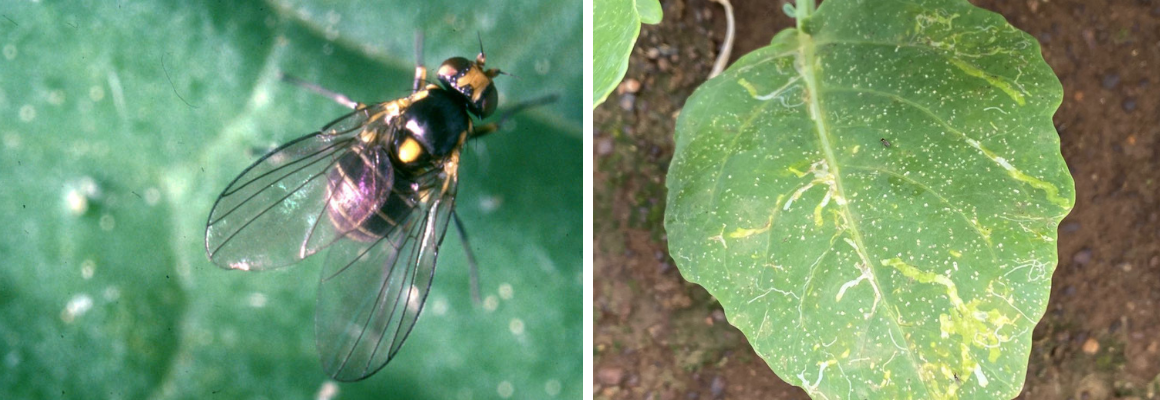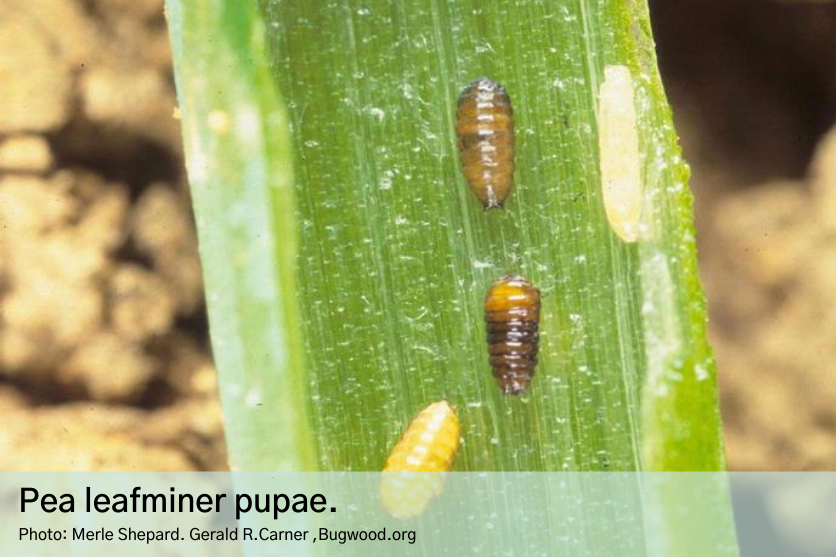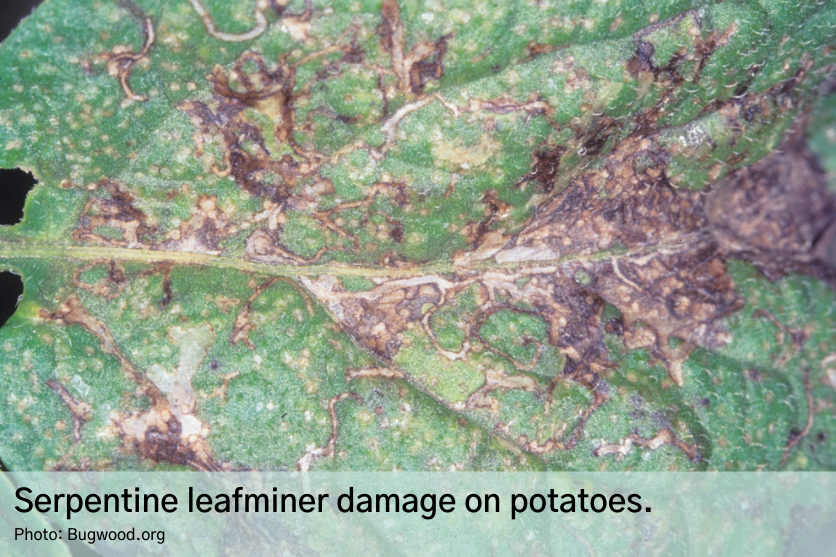
New VegKIT resources to help get kids to eat more veggies
24 November 2020
Vegetable Crop Nutrition Masterclass reaps online rewards
30 November 2020Current situation:
There has been confirmed detections of serpentine leafminer (also known as Pea leafminer) Liriomyza huidobrensis on field grown vegetables in Western Sydney in New South Wales and Kalbar in the Fassifern Valley region of Queensland.
Serpentine leafminer is an exotic leafminer species that poses a significant economic threat to Australia’s horticulture and nursery production plant industries.
It has a wide host range of plant species, which includes broccoli, beet, spinach, peas, beans, potatoes and cut flowers. Severe unmanaged infestations of serpentine leafminer may result in premature leaf drop, poor growth, and reduced crop yields.
The pest is wind-borne and eggs, larvae and pupae can be spread through the movement of plant material, soil, clothing and equipment.
Serpentine leafminer damage is primarily caused by larvae feeding under the surface of leaves. Typically, this feeding causes long, narrow, serpentine-shaped ‘mines’ which appear as white or grey lines on leaves with dampened black and dried brown areas.
There have been no previous detections of serpentine leafminer in Australia.
The Consultative Committee on Emergency Plant Pests met on 23 November 2020 to discuss the incident. The committee agreed to recommend to the National Management Group that the serpentine leafminer is an Emergency Plant Pest as defined by the Emergency Plant Pest Response Deed.
However, due to the locations of the incident, the current spread of the pest, the pest’s biology that includes a diverse host range the committee agreed to recommend that it is not technically feasible to eradicate.
A technical workshop with research and development experts will be held to further explore control options and identify knowledge gaps. Plant pest specialists will consider how to assist industry to manage serpentine leafminer and minimise the pest’s impact.
New South Wales:
On 22 October 2020 a grower in Western Sydney phoned the Exotic Plant Pest Hotline and reported the presence of suspected exotic leafminer on his property.
When the property was inspected on 23 October 2020, several vegetable hosts were infested, with the infestation having spread across the property. Live and dead specimens were collected and submitted for diagnostic testing.
On 29 October 2020 the specimens were identified as serpentine leafminer. This identification was confirmed on 2 November 2020. Secondary confirmation testing has been completed and the specimens confirmed as serpentine leafminer.
Further surveillance activities have identified 13 infested properties, including the initial property. The infested properties include nurseries and commercial vegetable growers.
One of the infested properties is located in Orange. A further 23 properties in NSW are suspected of being infested.
Infested properties have been issued an Individual Biosecurity Direction to control and manage serpentine leafminer on site and stop the spread.
The NSW Department of Primary Industries (NSW DPI) has established a State Control Centre at Orange and a Forward Command Post at Narellan to coordinate the response. Surveillance and tracing activities are continuing.
Queensland:
Three larvae were collected from an infested bean crop in Kalbar. The larvae tested positive for serpentine leafminer. An adjoining farm to the infested property has links to the incident in Western Sydney.
Biosecurity Queensland is initiating surveillance activities focusing on a 5km radius around the infested property and any additional properties identified through tracing activities.
Individual property quarantines are not likely to significantly slow the spread of the pest and are not part of the current response strategy.
Further information about current control methods and recommended chemical management options can be found on this NSW DPI website.
Public advice and reporting:
Production nurseries and growers should always check their crops regularly for signs of plant pests and disease. If you suspect a serpentine leafminer infestation, report it to the department of primary industries or agriculture in your state or territory. You can do this by phoning the Exotic Plant Pest Hotline on 1800 084 881.
Good on-farm biosecurity practices are vital to preventing incursions of plants the pests and diseases.
The farmbiosecurity.com.au website has helpful information that can be tailored to your property.
About serpentine leafminer:
Serpentine leafminer is an exotic species that pose a significant economic threat to Australia’s horticulture and nursery production plant industries.
Serpentine leafminer is a plant pest that has a wide host range of plant species which includes broccoli, beet, spinach, peas, beans, potatoes and cut flowers.
The pest can fly, and eggs, larvae and pupae can be spread through the movement of plant material, soil, clothing, and equipment.
Serpentine leafminer damage is primarily caused by larvae feeding under the surface of leaves. Typically, this feeding causes long, narrow, serpentine-shaped ‘mines’ which appear as white or grey lines on leaves with dampened black and dried brown areas.
High levels of infestation affect the plant’s ability to photosynthesise, reducing plant growth and crop yields.
For further information and photos visit the NSW Department of Primary Industries website.
Damage:
Serpentine leafminer damage is primarily caused by larvae feeding under the surface of leaves. Typically, this feeding causes long, narrow, serpentine-shaped ‘mines’ which appear as white or grey lines on leaves with dampened black and dried brown areas.
High levels of infestation affect the plant’s ability to photosynthesise, reducing plant growth and crop yields.
Response arrangements:
The Consultative Committee on Emergency Plant Pests provides technical and scientific advice in response to exotic plant pest and disease outbreaks. The Committee is chaired by Australia’s Chief Plant Protection Officer and comprises the Chief Plant Health Managers from each state and territory, other specialists from government, Plant Health Australia, and representatives from affected industries.
The Emergency Plant Pest Response Deed is a formal legally binding agreement between Plant Health Australia, the Australian, state and territory governments, and national plant industry bodies representing specific cropping sectors. The Deed covers the management and funding of nationally agreed responses to emergency plant pests.
More information about the national response arrangements for exotic pests and diseases can be found at outbreak.gov.au.



